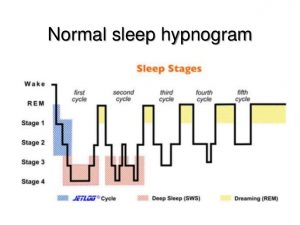Do you feel tired? Lack of energy? Does your child snore? These are common symptoms that your dentist can help detect. Early detection and treatment can have life changing consequences.
We spend one third of our lives sleeping. Sleep is necessary for us to recover and our bodies to heal. So the quantity and quality of our sleep is critical for health and your lifespan. Without quality sleep, we can become fatigued, suffer from depression, have increased risk of cardiovascular disease, become irritable, have poor memory, reduced lifespan and many other issues.
On average, we should be getting 6.5-8.5 hours of sleep per night. During this time, it is critical to go through several cycles. Have a look at the graph below, which is called a Hypnogram.

When we begin to sleep we go through different stages. We start with light sleep (stages 1 and 2), followed by deep sleep (stages 3 and 4) and then enter into dream sleep (REM; which stands for Rapid Eye Movement). So, the first half of the night is where our deep sleep occurs allowing for physical recover. The second half of the night is where we dream.
There are several important points about dream sleep:
- This is the time where our mind is able to consolidate memories
- Unlike the other stages of sleep, this is the stage where our brain is as active as it is when we are awake, however the difference is that our muscles are paralysed.
So what happens if we don’t go through all these phases? Or what happens if these phases are interrupted or shortened?
We now understand that a whole range of mental, physical, immune, memory, mood disorders can result. And this is without us even knowing about it. These are classified as chronic issues meaning that they occur over time and the effects are cumulative. Similar in a way that thickening of arteries can lead to a heart attack.
One part of sleep related to dentistry is the area of obstructive sleep apnoea (OSA). This is when we actually stop breathing at night for 10 seconds or more! And this can happen hundreds of times each night! Each time we stop breathing, the body, in an effort to get us oxygen jolts us into taking a breath, which in effect disrupts the sleep pattern. This means that we don’t go through all of the stages of sleep properly. The results of which can lead to anxiety, depression, cardiovascular disease, impaired memory, immune issues, tiredness etc.
Obstructive sleep apnoea is extremely common; 24% of males and 9% of females. Of these people, 90% are undiagnosed. And many of these people are not overweight.
One cause of obstructive sleep apnoea is the collapse of our airways. Basically our tongue falls back and blocks the airway. One of the treatments of this is wearing a device called a mandibular advancement splint which pushes our lower jaw forwards at night allowing us to breath.
Snoring may be one of the symptoms of OSA but there are many others.
Ask yourself:
- How long does it take you to fall asleep at night? If it’s longer than 15 minutes there may be sleep issues.
- Do you wake up to go to the bathroom at night? This is a sign of disturbed sleep
- Do you wake up feeling energised? If not then sleep may be disturbed
What about children?
In children, snoring is almost definitely a sign of OSA. These children are 9 times more likely to be in the bottom 10% of the class and many of these may have been diagnosed with ADHD.
Sleep is a very large area in dentistry and medicine that we are learning more about all the time. Currently it has transformed orthodontics – that area of dentistry traditionally thought of as just straightening of the teeth. Orthodontics now has a large part in “opening” the airways of children in order to prevent breathing/sleeping issues as an adult.
In future articles we’ll discuss in greater detail the consequences of poor sleep, OSA and what effects it can have on our teeth, jaws, muscles and joints of the face.
What do I do if I suspect I have sleep problems
At Sydney Road Dental Care we focus on early detection and prevention. If you think you may have any of the symptoms contact us so that you can have a thorough examination and consultation. Follow this link to learn about your first visit with us or simply contact us for an appointment.

